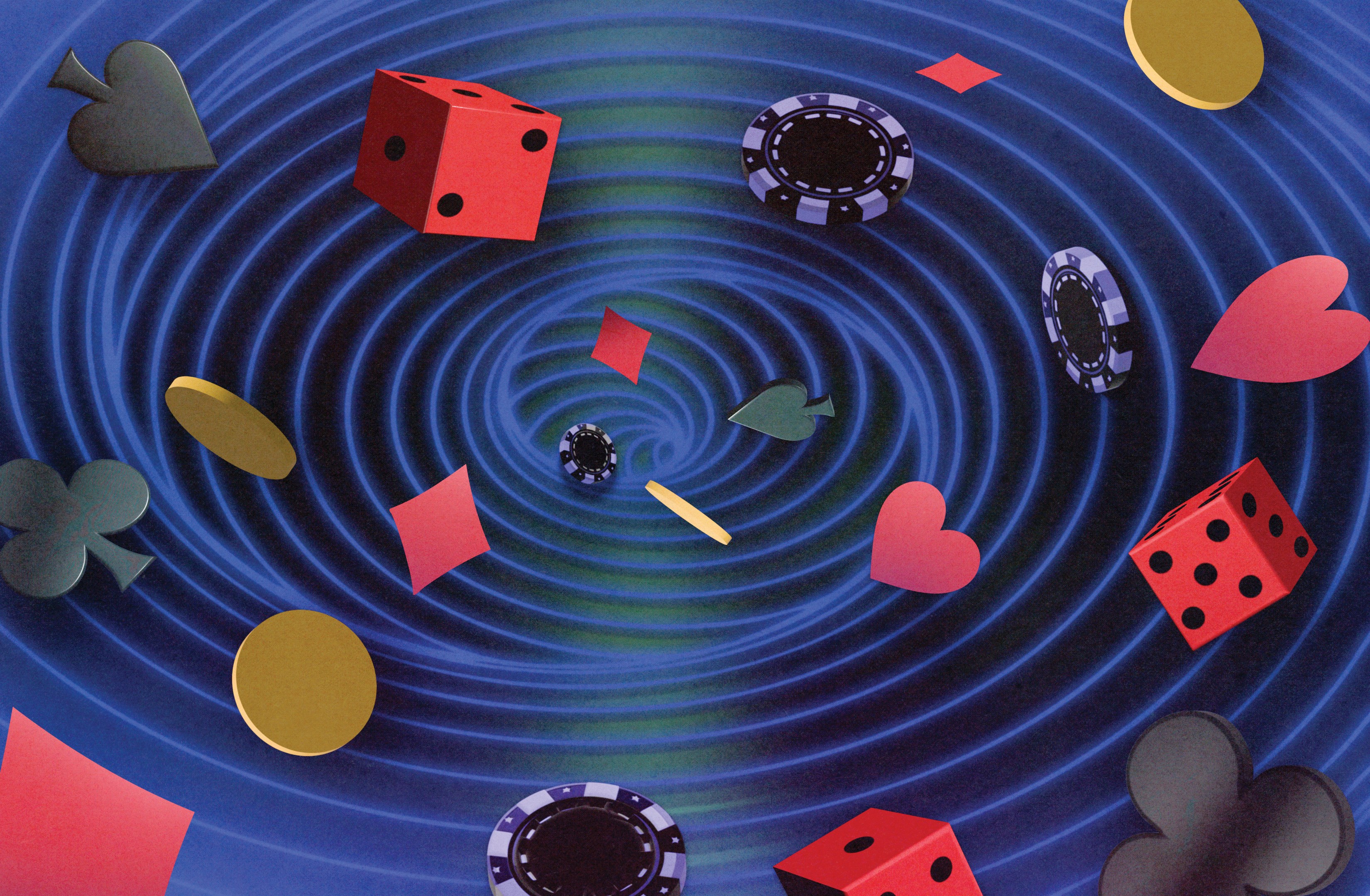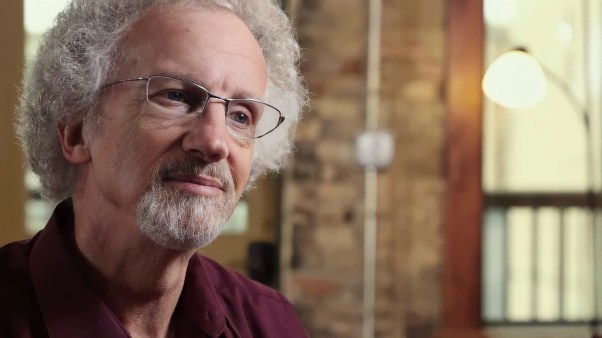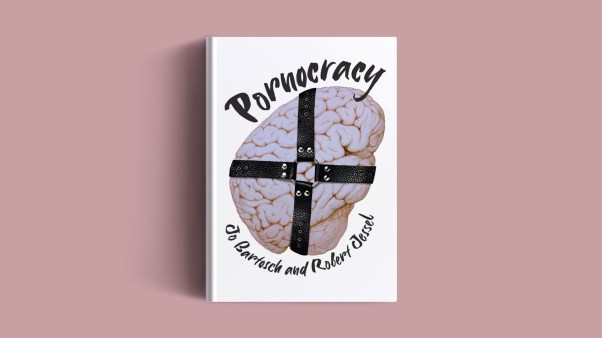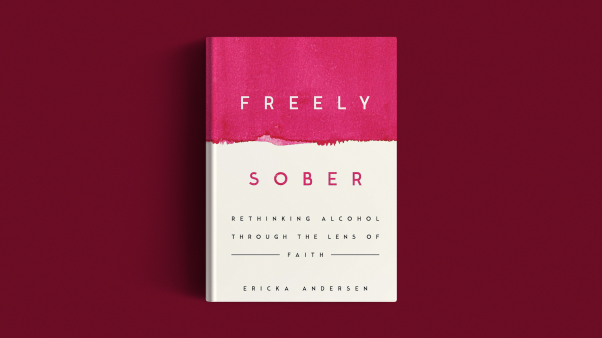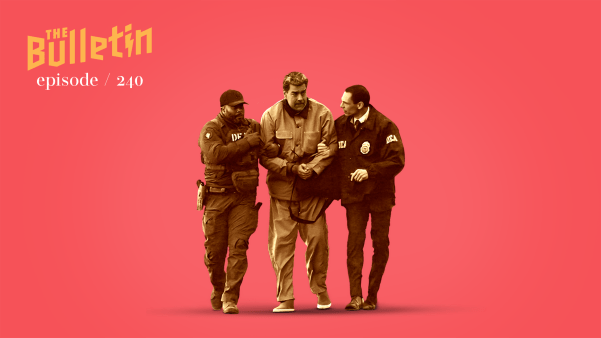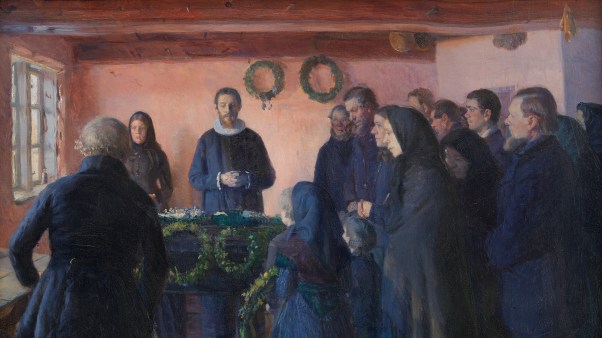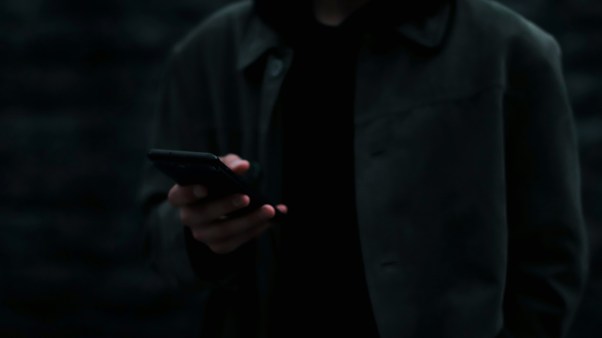When I walk into an Appalachian casino on a Friday evening, every sense in my body dilates with the onslaught of stimulation. Outside the casino, it was cool, with dusk descending over a quiet parking lot of pickups and sedans and one limousine. Venus was just visible in the sky.
Inside, up an escalator into a vast hall, everything is consumed by a sound like a screaming eagle or a missile streaking to earth, and Olivia Rodrigo’s voice sings from above me, “Well, good for you, you look happy and healthy, / Not me, if you ever cared to ask.”
The room is so big it feels like it could be measured in acres: aisles and aisles of games with hundreds of people playing patterns of whirs and numbers, clicks and colors—seemingly infinite colors, all of them neon—and each person at each machine has a personal rhythm, at that moment joined with the game in a completely contained world.
The machines advertise their worlds with words that run together like the witches’ incantations in Macbeth: double-double, phoenix, dragon, buffalo trouble, phoenix (again), platinum, champagne, train robbery, cash-cash-cash. Slightly drunk people cheer for each other at a blackjack table, $25 minimum bet. One table over, a man in a dotted shirt plays alone with a dealer. Two over, a waitress in black brings drinks.
The casino never closes. One month this spring, it raked in $21 million after paying out winnings. Another month, it earned $19 million. People in this town make a median income of $44,700 a year. The gambling goes on and on.
Long gone are the days when gambling was something that happened in Vegas and stayed there. “America is one big casino now,” Business Insider reported in 2024. Most Americans live within an hour of slot machines, blackjack tables, and craps. There are more than 1,000 casinos across the country, and more are planned this year and next year for several major metro areas, including Dallas–Fort Worth, New York City, and Chicago.
Gambling in America isn’t restricted to casinos, either. Forty-five states have government-run lotteries, which makes every gas station and grocery store a place to gamble. On the internet, you can bet on real-life events, like whether the US will have a recession, the outcome of the papal conclave, and the fate of Jay-Z and Beyoncé’s marriage.
Then there’s sports betting. It was prohibited by federal law until 2018, when the Supreme Court ruled that states could allow it if they wanted. Now it exists in 38 states. It’s America’s new favorite pastime. Forget baseball. Forget football, basketball, hockey, soccer, golf, tennis, mixed martial arts, NASCAR. People are now watching sports not for the spectacle but to bet on the outcomes. The amount wagered has grown more than tenfold in five years, from $13 billion in 2019 to $148 billion in 2024.
To be sure, there are moral and public-policy questions to ask about all this gambling. But, walking into the casino less than an hour from where I live, I’m seized by the more basic question of human desire. What do Americans want, exactly, when they gamble?
I suspect the answer is spiritual. To me, at least, all this gambling sounds like wild, misdirected prayer.
Philip is a recovering gambling addict who works at a hotline for gamblers who are in trouble. He reached out to CT after we reported how little evangelicals are doing to grapple with the growth of sports betting, hoping to share his story. Philip used to bet on sports on his phone. He won for a while, but then he lost and lost, kept losing, and couldn’t stop.
He might lose still more. He’s facing years of possible prison time because he embezzled money from his employer—more than $1.2 million over four months—to keep gambling. As he reflects on what went wrong, he thinks there was a spiritual reason. His gambling was misdirected longing.
“I went to it to give me something—something that would fill a void for me,” Philip told me. “I think that all addiction is a spiritual crisis. It’s trying to get something from the world that only God can give you.”
Augustine would agree. The great African bishop said this is our basic human problem: We seek the eternal in the transient. We want God but don’t know where to look for him. We look around and see stuff, but stuff is always changing, mutable, restless—and we’re that way too. We look inside and see our longing, lust, and desire. But even our wants aren’t stable. We think we know what we want, but then in the shift of a shadow, a flip of a card, it slips away.
“Stretch wide the net of your insatiable desires, greedy,” Augustine once preached. “Let everything you can see be yours; let everything under the water which you can’t see be yours. When you’ve got all this, what will you have in fact if you haven’t got God?”
It’s easy for us to get lost in longing. Americans have been doing that a lot recently, stretching wide their spiritual nets and catching all kinds of things that aren’t Jesus. Identification with organized religion is declining in the US, as it has been as long as I’ve been alive. But America has not become a nation of secularists and empiricists, believing only what they can see, touch, and test. Instead, there is an effusion of esoterica and re-enchantment.
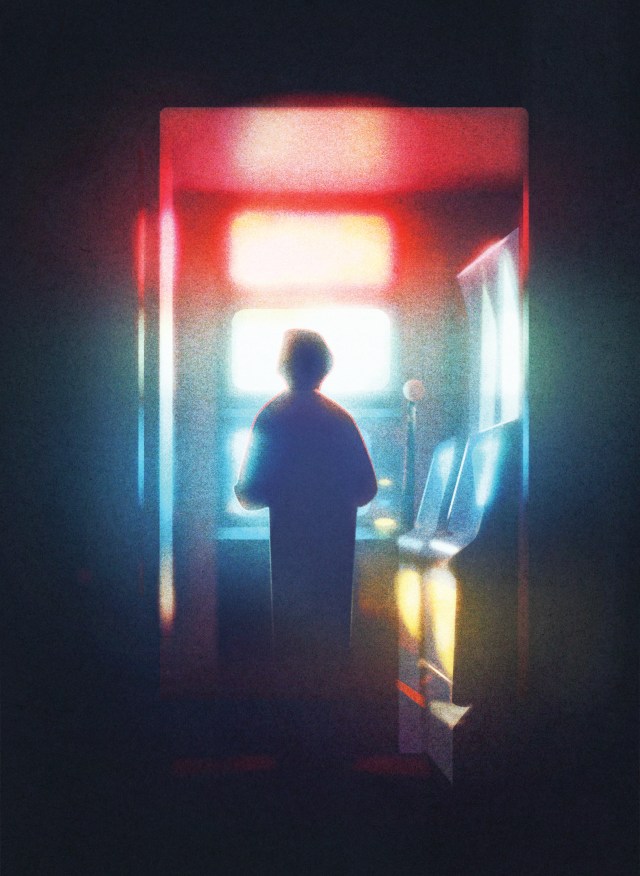 Illustration by Mark Pernice
Illustration by Mark PerniceThe country is awash in experiments with cosmic connection: grounding, crystals, yoga, chakras, channeling, astrology, and more. People are playing with and trying on different ideas of ultimate meaning and attempting to tap into the order of the universe to experience personal fullness. They’re chasing rumors of angels, scrolling through TikTok exorcists, having revelations of divinity with artificial intelligence, and thinking maybe vampires are real.
Sociologist Christian Smith calls this surging spiritual experimentation “occulture.” Today, he says, “a raft of paranormal, magical, occultic, and New Age ideas” has entered mainstream life. In the research for his most recent book, he found that nearly half of Americans think reincarnation could be real. About 20 percent say the same for magic spells and curses. A quarter of the people in his study confidently believe in nature spirits or spiritual energies, and nearly 40 percent are convinced that there is a universal force like karma, repaying good and bad and maintaining balance. Nearly half say they are open to the reality of good-luck charms, lucky numbers, and lucky symbols.
I want to put gambling in this same cultural category. For many gamblers, playing slots or buying a lottery number or betting on athletic competitions is an attempt to find the immutable in the mutable, to latch on to something somehow permanent in the endlessly changing patterns.
Brian Koppelman has talked about gambling in spiritual terms. He wrote the poker movie Rounders, the casino-robbery movie Ocean’s Thirteen, and the poker tournament TV show Tilt. He’s culturally Jewish and an atheist but also practices transcendental meditation. And he thinks gambling is, in some deep sense, spiritual. “For nonreligious people,” he said, “it’s like a way to grapple with God.”
It’s not just about winning money. Statistician Nate Silver says that serious, successful gamblers like to win, of course. But what they love is risk. Put money on a game, raise the stakes, and suddenly everything else is blocked out; the game is the only thing in the world that matters.
This is the experience of unsuccessful gamblers too. Anthropologist Natasha Dow Schüll said that when she started studying problem gamblers who are addicted to slot machines, she assumed they were deluded and had somehow been tricked into thinking they could beat the odds. They told her that wasn’t it at all.
What the gamblers wanted, more than anything, was to be in sync with the game. Gambling allowed them to zero in, blocking out the world, its problems, and their own problems (including the problems created by gambling). They merged with the rhythm of the slot machine and did whatever it took to stay locked in.
“I don’t care if it takes coins, or pays coins,” one told Schüll. “The contract is that when I put a new coin in … I am allowed to continue.”
Another said, “I feel connected to the machine when I play, like it’s an extension of me, as if physically you couldn’t separate me from the machine.”
At the casino, I get my phone out to take notes and realize I’m the only one. No one else has a phone out. Everyone’s focused.
I look over at a blackjack table where all the players seem to be losing. They put down their bets: $25, $25, $25, $50, $25. The dealer has a jack and an ace, 21, and takes all their money. They go again: $25, $25, $25, $50, $25. The dealer takes the chips from four of the five of them this time, and they all go again, laying down their chips: $25, $25, $50, $50, $25.
None of them has a phone face-down on the table to glance at between turns. No one reaches for a pocket, that I can see. They are in it. There are no distractions.
It looks like they’re meditating. Everything around them is changing, shifting, spinning, restless. Just the noise of the place is overwhelming. But they’re sitting there as if they’ve latched on to something timeless and as if they never, ever want to look away.
I ran out of money my junior year at Hillsdale College and had to drop out of school. I moved to Pennsylvania, where a friend of mine was going to seminary, and got a job working at a gas station.
Mostly what I did was sell lottery tickets: scratch-offs, Powerball, and twice-daily drawings where people would bet they could guess a three- or four-digit number. People would read me their lists of numbers, and I would type them into a machine and print them out. People liked to play 222. A lot of them played 215 and 610, which were the local area codes. They played important dates—birthdays, anniversaries—and numbers they just liked.
Sometimes, at the end of their standard list, customers would add a number just for that day. I remember one Sunday afternoon when a middle-aged Black woman came in and gave me her list, adding, “And let me have 828 and 829.”
“All right.” I paused, then asked, “Why those numbers?”
“That’s what the pastor preached on today,” she said. “From Romans: ‘All things work together.’ ”
Then she said, “One more—let me have 3399.”
“What’s that one?”
“Woman at church had a new dress she told everybody she got on sale for $33.99.”
There was another customer, a white man with an Italian name who ran an air conditioning business. He’d buy gas and play the number of the amount of gallons he got. One time he asked me where I lived, and when I told him my address, he played that number. It came up in a drawing the next day, but the digits were in a different order, and he said he kicked himself for not playing all the possible combinations.
The people who played the lotto at the gas station moved through the world looking for numbers. Perhaps they thought the universe was speaking in numbers, and if they focused and listened, really listened, they could learn to align themselves with its thrum.
Sometimes the information came to them in sermon texts—though not any meaning of the texts I would have heard—and sometimes through conversations with neighbors or random license plates in front of them when they were stuck in traffic. When they won, it was like they felt the cosmos said yes. Like the secret pattern affirmed them and blessed them. I don’t know how to make sense of this except as a kind of mysticism, spiritual experimentation, and “occulture.”
There are times in history when Christianity stops seeming plausible to groups of people. Broad swaths of the population start to doubt whether theology is true and, even more acutely, whether the religious practices and disciplines of Christian life are effective. Going to church seems like a waste. Prayer feels empty and rote. Listening to ministers seems pointless.
Many give it all up. Others keep going, propelled by tradition and obligation if not personal experience of transformation. The deep desire to connect to the eternal in the transient remains for all, however, so people start grabbing onto alternative spiritual technologies.
Historically, gambling seems to surge in times of growing distrust of traditional Christianity, organized religion, and religious authorities. When lots of Americans are spiritual but not religious, increasing numbers of people take their chances with chance.
Historian Jackson Lears says white Protestants in 1800s America first flocked to gambling when ideas of God’s providence started to lose their grip on the popular imagination. When Puritan ministers lost political power in Connecticut, for example, the sales of lottery tickets exploded. A young P. T. Barnum, in his pre-circus days, remembered selling tickets as fast as he could print them. When the ministers reclaimed some political power a few years later, one of the first things they did was shut down the lotteries, ruining Barnum’s booming business.
To those Puritans, the lottery seemed a kind of heresy. It was not just frivolous fun or a waste of money but a covert theological claim to divine a pattern behind the numbers, somehow gaining secret access to the mind of God. Perhaps, the ministers said, there had been a time when discerning the will of God meant casting lots, the way the apostles did in Acts 1:26, but that was past. Now, if you wanted to know Providence, you should search Scripture and ask a minister.
But when people didn’t trust those ministers or their ability to explicate the order of divine design, they became very interested in games of chance. After the Civil War, the Unitarian minister Octavius Brooks Frothingham was appalled to find that churches were empty but casinos full.
He stumbled into one gambling establishment and watched a man play roulette while clutching a small box, the bottom painted half red, half black. The man had a spider in the box and watched to see whether the spider went to the red side or the black side. That’s how he bet his money.
The man wouldn’t have listened to Frothingham or any other minister tell him how to spend his money or what to do with his life. But he’d trust a spider. Or a shuffle of cards. Or a pair of dice. He was playing games, but they weren’t just games, according to Frothingham. The dice box was, to that man, “the dice box of destiny.” It seemed to Frothingham like a new spirituality.
Historian Jonathan Ebel found that a similar spirituality emerged among American soldiers who saw combat in World War I. Respected religious authorities—the nation’s prominent Protestant ministers—explained the horrors of war in terms of redemptive violence and heroic sacrifice. This was a crusade for democracy and a war to end all wars. So they said each death was holy, efficacious, and meaningful.
But many who saw death up close could not resolve what happened in battle with such a theology. None of it seemed to make any sense. One person died, another lived, and it was random. So they turned to an alternative spirituality of luck.
Some soldiers reported supernatural experiences. A boy from Massachusetts named Elmer Harden, for example, saw an otherworldly being he described to his mother as a man-angel. “I knew it for Chance,” he wrote, swearing this was not his imagination or a fanciful thought but the truth as he experienced it. He said he survived the fighting only because of this being. “My faith in him … was complete,” Harden said. “He was my God.”
According to Ebel, that kind of supernatural experience was unusual, but many people had the sense they could detect a divine force in the randomness of the battlefield. As they stopped believing that the order of the universe could be discovered through listening to sermons, they turned to experiences of chance, convinced they could somehow discover their own election amid the chaos and confusion.
That’s the same spirituality I saw in the gamblers at the gas station. They wanted to touch God, even if they wouldn’t have put it that way. They wanted to be in sync with the truth that is unchanging behind all the transient things they could see. And they thought they could do it if they just picked the right numbers.
At the casino, I watch a group of three friends in their 20s play blackjack. One of them, a short, muscular guy in a black T-shirt, wins a hand. His buddies slap his back and shoulders and exclaim “Kyle!” in congratulations. Then they play another hand. Kyle bets a stack of five or six chips. He wins, doubling his $200 or $225 with a hand of 20 to the dealer’s 17.
Kyle’s friends explode in hollers, and one almost shoves him off his stool. He just smiles. It’s the smile, I think, of someone who feels he’s been chosen. He’s found his resonance with the universe and grins like someone confident that his election is secure.
Dan hates this idea. He is a professional gambler who quit a doctoral program studying theology to play blackjack. Before that, he was in another graduate program studying moral philosophy, which is where he learned to play poker. I know someone who went to school with him. I asked him my question. Does it make sense to think of gambling as a kind of spirituality?
Dan groaned. “I don’t enjoy casinos. There’s a lot of depressing, terrible vibes. If that’s spiritual, I’d say no thanks,” he said.
Dan spends a lot of time in casinos. He travels around the country playing blackjack and winning. But the feeling he gets most from gambling is sadness. He pushes it down to keep playing. To be a professional gambler, he said, you have to control what you feel.
One big difference between winning and losing, according to Dan, is how good a gambler is at preventing “leaks.” A leak is what he calls any habit that makes you lose money: drinking too much, betting more impulsively after losing a hand, giving money to a friend to gamble with you so you’re not so lonely.
“You need to be robotic. You have to emotionally train yourself to be like, ‘Another day at the salt mines,’ ” Dan said. Anything that’s too human is a vulnerability.
As Dan talks about blackjack, in fact, it sounds like it’s half a game of counting cards, half a game of containing the human parts of yourself. Each game is another encounter with inchoate longing. The challenge of the game is that with the next card, or the next, or the potential of the next, the human heart might attach itself deceptively to another impermanent thing. To win, Dan has to resist that spiritual (and human) pull, hand after hand.
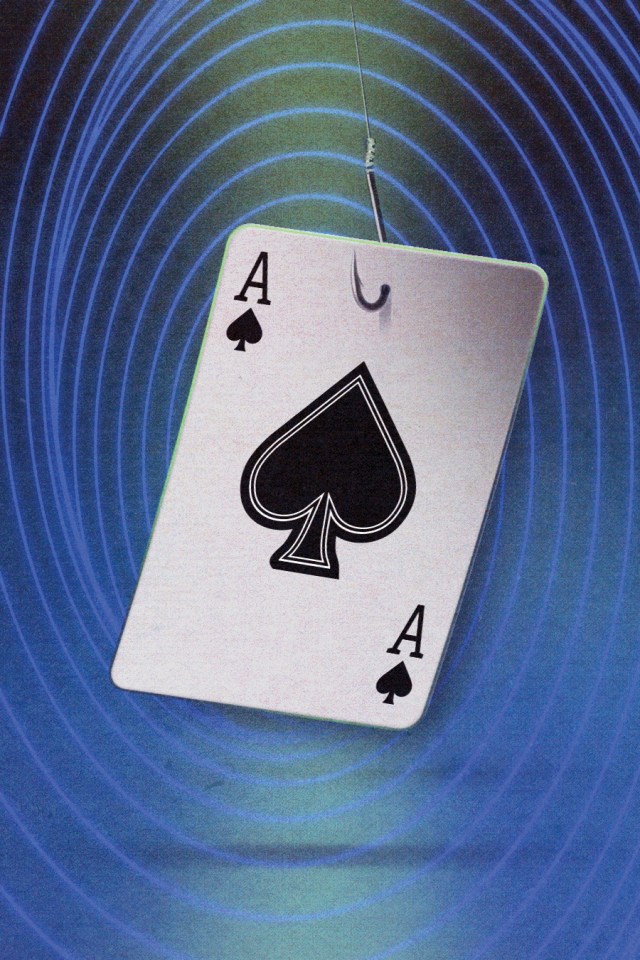 Illustration by Mark Pernice
Illustration by Mark PernicePhilip, the recovering gambling addict, could not resist the way the game on his phone responded to his spiritual desire. He told me he started out just betting on his college football team, Florida State, and thought at the time that gambling enhanced the experience of watching sports, increasing his focus on it.
Then gambling gave him a sense of affirmation, the reward of the feeling when he won. It felt like a nod from the universe. Each bet made him want to bet again. But then a $1,000 wager would turn into $2,500, and $2,500 would turn into $45,000, and he’d keep betting and betting—going “on tilt”—until three or four days had gone by and he was down more than $220,000.
He was attending an evangelical church the whole time he had a gambling problem, he said, but he was mostly just going through the motions. He liked podcasts about stoicism. The idea of self-control was really appealing. He couldn’t seem to have it, though. He’d gamble on 100 games in one day, and 80 percent of his waking thoughts seemed to be about sports betting. The shame of his lack of stoic restraint made him feel like he was drowning.
When he got caught and was arrested, police put him on suicide watch for a week. He’s deeply grateful they did. When he couldn’t gamble, Philip said, he was afraid to be alone with his thoughts. In his cell, he started to pray.
“It was raw. It was just me asking God for help over and over again,” he said. “Eventually I got strong enough to say the Lord’s Prayer.”
Philip’s church came around him and got him into an addiction treatment program while he waited for the court to decide his fate. He spent six months in a gambling recovery group and then joined a general recovery group at his church. People there struggle with drugs, alcohol, or porn.
He shares about his gambling addiction and how, when he’s tempted, the thing that works for him is prayer.
“Where I would have that compulsion to gamble, I turn all that to prayer,” he said. “I probably prayed for 75 to 90 days before it started working. Then I noticed, Wow, this is working.”
He starts with the Lord’s Prayer now, then goes into something longer, using his own words. These days, he knows what he wants. It’s not a mystical something, an elusive stability in the tumult of transience. He’s not trying to sync up with a cosmic order that comes into focus for a moment before it slips away. He wants Jesus.
“The person who knows the truth knows it, and he who knows it knows eternity,” Augustine wrote in Confessions. “Eternal truth and true love and beloved eternity: you are my God.”
The casino is a whorl of sounds and lights and luck and longing. “The longing for grace remains at the heart of the culture of chance,” Lears, the historian, writes. Hope persists that maybe we’ll get lucky.
I know that God can answer even wild prayers. The Israelites in the wilderness looked to a bronze sculpture of a snake and were healed (Num. 21:4–9). Gideon asked God to wet a fleece with dew one night and to leave it dry another (Judges 6:36–40). An Ethiopian eunuch wished someone would explain the prophet Isaiah to him (Acts 8:31). Augustine wanted to be chaste (but not yet), and a friend of mine converted after a clogged toilet coughed up a child’s toothbrush.
“The Spirit helps us in our weakness,” the apostle Paul wrote. “We do not know what we ought to pray for, but the Spirit himself intercedes for us through wordless groans. And he who searches our hearts knows the mind of the Spirit” (Rom. 8:26–27).
At the casino, I see a dealer standing at an empty table, shuffling cards, setting up for a shift. He wears sadness like a cologne. For a moment, an image of his face as a boy flashes across my mind. Lord, have mercy upon us, I think, which is something I pray when I don’t have words. Christ, have mercy upon us.
A man with a backward cap at an automatic craps game flexes the fingers of his right hand ever so slightly to trigger the next roll of dice, and the next, and the next. He blinks every third roll on the beat. I take out my phone to type more notes. Lord, hear our prayer.
A woman plays the phoenix game, the bird rising again on the machine in pixelated flames with a digital screaming sound. She is wearing a flowered dress that looks like it’s made for Easter. Down the same aisle at two other machines, I see two more women wearing Easter dresses. Lord, hear our prayer.
Outside, the stars are out. It’s dark now. A second limo is parked by the first, and a man in a Chevy pickup is scratching off a lotto ticket on his steering wheel.
There is so much gambling. So much restless desire. Lord, hear our prayer.
Daniel Silliman is CT’s senior news editor.

